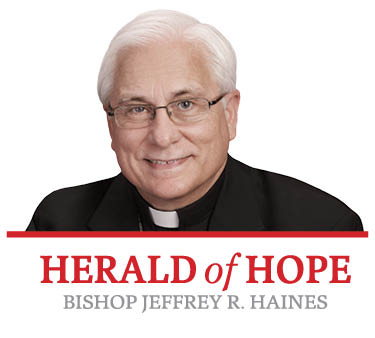 One of the complaints sometimes leveled against organized religion is that it is not relevant to the concerns of people engaged in the matters of the modern world. Some charge that religious institutions are overly pre-occupied with the past, other-worldly things and maintaining their own bureaucratic structure.
One of the complaints sometimes leveled against organized religion is that it is not relevant to the concerns of people engaged in the matters of the modern world. Some charge that religious institutions are overly pre-occupied with the past, other-worldly things and maintaining their own bureaucratic structure.
I suspect that there were more than a few such critics who share such a perspective who would have dismissed the proceedings of the Spring Plenary Meeting of the United States Conference of Catholic Bishops (USCCB) which took place in Indianapolis last week. I even can imagine some uttering a derogatory remark about a “gathering of old men out-of-touch with the real world.”
Yet, as a first-time participant in the meeting of the USCCB, I can attest that nothing could be farther from the truth. The discussions of the bishops in Indianapolis dealt with many of the most up-to-date and pressing issues in our society, as there was an impassioned effort to integrate these contemporary issues with the mission of the Church.
One of the issues receiving the most attention was immigration in our country and throughout the world. It was reported that the migration of peoples has reached epic proportions, with some estimates listing the number as 244 million people world-wide and over 46 million people within the United States. Even more troubling is the report that the number of refugees in the world increases by 24 people per minute. In both general sessions and regional conversations, the bishops shared information about the efforts taking place in their own dioceses to bring aid and assistance to this problem. Strategies also were offered for bringing additional resources to bear on a national and international level. Most touching were the human interest stories shared by the bishops which “put a face” on the immigration statistics. There are some remarkable efforts taking place in parishes to break down barriers and to ensure that immigrants are no longer strangers, but rather friends.
Another discussion item prominent in the meeting was the topic of health care. As political deliberations take place in our nation’s capital about the possible repeal of the Affordable Care Act, the bishops spoke with heart-felt concern about the need to protect widespread access to medical treatment. The bishops expressed worry about legislative suggestions that seem to place more importance upon dollars and cents than on the health of the American people. There was a call to try to mobilize support among the faithful to speak to legislators in order to make sure that there should not be a repeal of the Affordable Care Act until an adequate replacement is developed – with special concern for the medical needs of the poor and the most vulnerable.
Another compelling conversation took place regarding the growing hostility throughout the world, which is resulting in international religious persecution and human rights violations. The bishops dedicated themselves to work towards greater respect and tolerance of the diversity of religious practice in our country and the world, and to strive to eliminate the prejudice which fosters antagonism among believers.
Lastly, the bishops voted to establish a permanent Standing Committee for Religious Liberty. Originally, this committee was given ad hoc status to respond to recent political efforts which sought to impose demands on organizations of the Church that are in violation of Catholic teaching (e.g., the US Department of Health and Human Services mandate which sought to require all employer health plans to provide free contraceptives, sterilizations and abortion inducing drugs). However, time has shown that threats to limit religious freedom have not abated, and the bishops affirmed the permanent status of this committee as a way of protecting the right of the Catholic Church and Catholic individuals to espouse our values and beliefs and to fend off efforts by government to restrict our participation in the life of the
public forum.
And, so, I departed the meeting of the USCCB in Indianapolis inspired and energized by the dedication of my brother bishops to bring the Gospel to bear on the issues of our time. While an organized religion like our Catholic Church certainly faces problems from time to time due to its institutional status, the matter of irrelevancy is not one of them. Clearly, our Church is in the heart of the world, and is fully engaged in efforts to speak the message and put into practice the mission of Jesus Christ.
